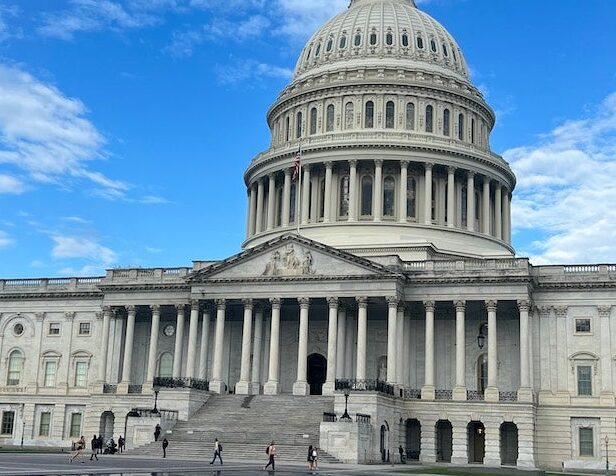Cassidy: Spending deal would avert possible federal shutdown
Published 2:16 pm Tuesday, September 24, 2024

- (Crystal Stevenson / American Press)
U.S. Sen. Bill Cassidy and his colleagues will vote this week on a short-term continuing resolution to fund the government through December, a move that could avert a possible partial government shutdown when the new budget year begins Oct. 1 and push final decisions until after the November election.
Cassidy, R-Louisiana, said he supports the bill — adding House Speaker Mike Johnson, R-Louisiana, ensured legislation for the National Flood Insurance Program would be authorized in the bill as well as the Pay Our Troops Act.
In a letter to Republican colleagues, Johnson said the budget measure would be “very narrow, bare-bones” and include “only the extensions that are absolutely necessary.”
Trending
“As history has taught and current polling affirms, shutting the government down less than 40 days from a fateful election would be an act of political malpractice,” Johnson wrote.
Also included in the bill is an additional $231 million to bolster the Secret Service after the two assassination attempts against Republican presidential nominee Donald Trump.
“They need resources,” Cassidy said Tuesday during a phone conference with Louisiana media. “There has been two assassination attempts on President Trump’s life. That is wrong and the Secret Service needs that money.”
Cassidy said the bill also “plugs up” money designated for the Federal Emergency Management Agency to offer hurricane relief to Louisiana families impacted by Hurricane Francine.
“I’m still waiting to see the final language, but those are the good things I’ve heard of in it,” Cassidy said.
Trending
Energy security
Cassidy said the Senate Energy and Natural Resources Committee will “mark up” his Reinvesting in Shoreline Economies & Ecosystems (RISEE) Act on Thursday, which amends the Gulf of Mexico Energy Security Act (GOMESA).
“It eliminates the state revenue-sharing cap and creates a new dedicated stream of funding from offshore oil and gas development and offshore wind to be used for coastal protection and resiliency,” he said. “By removing that revenue-sharing cap, we bring back billions of additional dollars to Louisiana to help rebuild our shoreline, to help support flood-control structures and — along the way — create tens of thousands of good-paying jobs. This is good for our economy, it’s good for our environment, it’s good for the nation.”
Cassidy said similar legislation was passed by the committee in the previous session but later stalled.
“We want to get it all the way through this time,” Cassidy said. “I’m working extremely hard on that.”
Cassidy will be hosting the Louisiana Energy Security Summit Oct. 16 at the Capitol Park Museum in Baton Rouge. He said the summit will bring together leaders from federal, stat, and local government, industry and the research community. Themes will include advancing energy security in a changing global landscape; exposing threats to global trade and energy security; implications for U.S. industries and competitiveness; supporting accountability and fair competition in global trade; enhancing U.S. competitiveness through Louisiana’s industrial exports; and strengthening U.S. geopolitical influence and advancing energy security.
Infrastructure
Cassidy said FEMA has been awarded Louisiana $206 million through the bi-partisan Infrastructure Investment and Jobs Act.
“That’s significantly more than almost any other state in this tranche of funding,” Cassidy said. “This includes $51 million for Gretna and a project in St. John the Baptist Parish to elevate 132 flood-prone homes.”
He said since the infrastructure bill was signed into law, Louisiana has received hundreds of millions of dollars to rebuild its coastline, fund flood protection and flood mitigation grants.
“The money from the infrastructure law has paid dividends in reducing the impact of storms when they hit our state and I’m extremely proud to have played a role in securing these dollars.”
He said the Department of Transportation has also announced the state will receive $4 million from the act for judging the difficulty of navigating around the New Orleans Airport’s new and old terminals, as well as improving other transportation infrastructure across Louisiana.
“I’m told the New Orleans Airport will use $2 million for planning, developing, financing, construction, maintenance and operation of an airport automated people mover system,” Cassidy said. “It will connect the north airport campus and the south airport campus and, upon its completion, it will connect with the Amtrak Intercity Passage Rail serving Baton Rouge and New Orleans.”
The other $2 million is being designated for improving pipelines, bridges and roadways to alleviate congestion.
“Investing in Louisiana’s transportation system is how we build an autonomy for 2050,” Cassidy said. “It makes movement better now and it makes our state more attractive for families and businesses to move to.”





